1966 FIFA World Cup
| World Cup 1966 | |
|---|---|
 1966 FIFA World Cup official logo |
|
| Tournament details | |
| Host country | |
| Dates | 11 July – 30 July |
| Teams | 16 (from 5 confederations) |
| Venue(s) | 8 (in 7 host cities) |
| Final positions | |
| Champions | |
| Runner-up | |
| Third place | |
| Fourth place | |
| Tournament statistics | |
| Matches played | 32 |
| Goals scored | 89 (2.78 per match) |
| Attendance | 1,635,000 (51,094 per match) |
| Top scorer(s) | |
|
← 1962
1970 →
|
|
The 1966 FIFA World Cup, the eighth staging of the World Cup, was held in England from 11 July to 30 July. England was chosen as hosts by FIFA in August 1960 to celebrate the centenary of the standardisation of football in England. England beat West Germany 4–2 in the final, winning the World Cup for the first time, so becoming the first host to win the tournament since Italy in 1934.
Contents |
Qualification

The 1966 World Cup was the subject of bitter disagreement before a ball was ever kicked. Sixteen African nations boycotted the tournament in protest of a 1964 FIFA ruling that required the champion team from the African zone to enter a playoff round against the winners of either the Asian or the Oceania zone in order to win a place at the finals. The Africans felt that winning their zone should have been enough in itself to merit qualification for the finals.
Despite the Africans' absence, there was another new record number of entries for the qualifying tournament, with 70 nations taking part. After all the arguments, FIFA finally ruled that ten teams from Europe would qualify, along with four from South America, one from Asia and one from North and Central America.
Portugal and North Korea qualified for the first time. Portugal would not qualify again until 1986, while North Korea's next finals appearance was at the 2010 tournament. This was also Switzerland's last World Cup finals until 1994. Notable absentees from this tournament included Yugoslavia and 1962 finalists Czechoslovakia.
Summary
The 1966 World Cup had a rather unusual hero off the field, a dog called Pickles. In the build up to the tournament the Jules Rimet trophy was stolen from an exhibition display. A nation wide hunt for the icon ensued. It was later discovered wrapped in some newspaper as the dog sniffed under some bushes in London. The FA commissioned a replica cup in case the original cup was not found in time. This replica is held at the English National Football Museum in Preston, where it is on display.
First round
The format of the 1966 competition remained the same as 1962: 16 qualified teams were divided into four groups of four. The top two teams in each group advanced to the quarter-finals. The draw for the final tournament, taking place on 6 January 1966 at the Royal Garden Hotel in London was the first ever to be televised, with England, West Germany, Brazil and Italy as seeds.[1]
Despite achieving record attendances for the time, 1966 was a World Cup with few goals as the teams began to play much more tactically and defensively. This was exemplified by Alf Ramsey's England as they finished top of Group 1 with only four goals to their credit, but having none scored against them. Uruguay were the other team to qualify from that group at the expense of both Mexico and France. All the group's matches were played at Wembley Stadium apart from the match between Uruguay and France which took place at White City Stadium.
In Group 2, West Germany and Argentina qualified with ease as they both finished the group with 5 points, Spain managed 2, while Switzerland left the competition after losing all three group matches. FIFA cautioned Argentina for its violent style in the group games, particularly in the scoreless draw with West Germany, which saw Argentinean Rafael Albrecht get sent off and suspended for the next match.[2] [3]
In the northwest of England, Old Trafford and Goodison Park played host to Group 3 which saw the two-time defending champions Brazil finish in third place behind Portugal and Hungary, and be eliminated along with Bulgaria. Brazil were defeated 3-1 by Hungary in a classic encounter before falling by the same scoreline to Portugal in a controversial game; this was Brazil's worst performance in any World Cup. Portugal appeared in the finals for the first time, and made quite an impact. They won all three of their games in the group stage, with a lot of help from their outstanding striker Eusébio, whose nine goals made him the tournament's top scorer.
Group 4, however, provided the biggest upset when North Korea beat Italy 1-0 at Ayresome Park, Middlesbrough and finished above them, thus earning qualification to the next round along with the USSR. This was the first time that a nation from outside Europe or the Americas had progressed from the first stage of a World Cup: the next would be Morocco in 1986. Chile finished bottom of the group.
Quarterfinals, Semifinals, and third-place match
The quarter-finals provided a controversial victory for West Germany as they cruised past Uruguay 4–0; the South Americans claimed that this occurred only after the referee (who was Jim Finney, from England) had not recognised a handstop by Schnellinger on the goal line and then had sent off two players from Uruguay: Horacio Troche and Héctor Silva.[4] It appeared as though the surprise package North Korea might do the same to Portugal when after 22 minutes they were in the lead 3–0. It fell to one of the greatest stars of the tournament, Eusébio, to change that. After he scored four goals in the game and José Augusto added a fifth in the 78th minute, one of the most incredible comebacks in professional football history was complete.
Meanwhile in the other two games, Ferenc Bene's late goal for Hungary against the USSR, who were led by Lev Yashin's stellar goalkeeping, proved little more than a consolation as they crashed out 2–1, and the only goal between Argentina and England came courtesy of England's Geoff Hurst. During that controversial game (for more details see Argentina and England football rivalry), Argentina's Antonio Rattín became the first player to be sent off in a senior international football match at Wembley. Rattín at first refused to leave the field and eventually had to be escorted by several policemen. After 30 minutes England scored the only goal of the match. This game, even today, is called el robo del siglo (the robbery of the century) in Argentina.[5]
All semifinalists were from Europe. The first semifinal between England and Portugal was controversial as well. Goodison Park in Liverpool was the original venue for the first semifinal. However, due to intervention of the English officials, the venue changed to Wembley.[6] Bobby Charlton scored both goals in England's triumph against Portugal. Portugal's goal came from a penalty kick in the 82nd minute after a handball by Jack Charlton on the goal line.[7] The other semi-final also finished 2–1: Franz Beckenbauer provided the winning goal for West Germany as they beat the USSR. Portugal went on to beat the USSR 2-1 to take third place. Portugal's third place remains the best finish by a team making its World Cup debut since 1934. It was subsequently equalled by Croatia in the 1998 tournament.
Final
London's Wembley Stadium provided the venue for the final, and 98,000 people crammed inside to watch. After 12 minutes 32 seconds Helmut Haller had put West Germany ahead, but the score was levelled by Geoff Hurst four minutes later. Martin Peters put England in the lead in the 78th minute; England looked set to claim the title when the referee awarded a free kick to West Germany with one minute left. The ball was launched goalward and Wolfgang Weber managed to poke it across the line, with England appealing in vain for handball as the ball came through the crowded penalty area.[8]
With the score level at 2–2 at the end of 90 minutes, the game went to extra time. In the 98th minute Hurst found himself on the score sheet again; his shot hit the crossbar, and bounced down and hit the ground either onto or just over the goal line. Whether the ball actually crossed the goal line or not has been a matter of discussion for decades, and this goal, known as the "Ghost Goal", has become part of World Cup history. Recent digitally-enhanced footage is said to clearly illustrate that Geoff Hurst's second goal did not cross the line.[9] England's final goal was scored by Hurst again, during a pitch invasion and the goal should therefore not have stood. This made Geoff Hurst the only player ever to have scored three times in a World Cup final.[8]
However, the fact of the illegality of the goal is illustrated by BBC commentator Kenneth Wolstenholme, whose description of the match's closing moments has gone down in history: "Some people are on the pitch. They think it's all over ... [Hurst scores] It is now!".[10]
England's total of eleven goals scored in six games set a new record low for average goals per game scored by a World Cup winning team. The record would stand until 1982, when it was surpassed by Italy's twelve goals in seven games; in 2010 this record was lowered again by Spain, winning the Cup with eight goals in seven games. Likewise, the total of three goals conceded also constituted a record low for average goals per game conceded by a World Cup winning team. That record would stand until 1994, when it was surpassed by Brazil's three goals in seven games.
England received the recovered Jules Rimet trophy from Queen Elizabeth II and were crowned World Cup winners for the first time.[8]
Mascot
World Cup Willie, the mascot for the 1966 competition, was the first World Cup mascot, and one of the first mascots to be associated with a major sporting competition. World Cup Willie is a lion, a typical symbol of the United Kingdom, wearing a Union Flag jersey emblazoned with the words "WORLD CUP".
Venues
White City Stadium in London was used for a single game from Group 1, between Uruguay and France. The game was scheduled for a Friday, the same day as regularly scheduled greyhound racing at Wembley. Because Wembley's owner refused to cancel this, the game had to be moved to the alternative venue.
| London | Liverpool | Sheffield | Sunderland |
|---|---|---|---|
| Wembley Stadium | Goodison Park | Hillsborough Stadium | Roker Park |
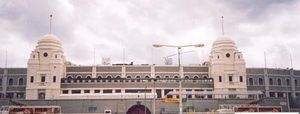 |
 |
||
| London | Birmingham | Manchester | Middlesbrough |
| White City Stadium | Villa Park | Old Trafford | Ayresome Park |
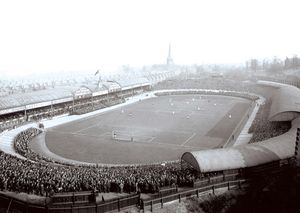 |
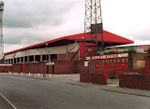 |
Match officials
|
|
- Europe
|
|
Seeding
| Pot 1: South American | Pot 2: Western European | Pot 3: European II | Pot 4: Rest of the World |
|---|---|---|---|
|
Squads
For a list of all squads that appeared in the final tournament, see 1966 FIFA World Cup squads.
Results

First round
Group 1
| Team | Pld | W | D | L | GF | GA | GAv | Pts |
|---|---|---|---|---|---|---|---|---|
| 3 | 2 | 1 | 0 | 4 | 0 | ∞ | 5 | |
| 3 | 1 | 2 | 0 | 2 | 1 | 2.00 | 4 | |
| 3 | 0 | 2 | 1 | 1 | 3 | 0.33 | 2 | |
| 3 | 0 | 1 | 2 | 2 | 5 | 0.40 | 1 |
| 11 July 1966 19:30 BST |
England |
0 – 0 | Wembley Stadium, London Attendance: 87,000 Referee: Istvan Zsolt (Hungary) |
|
|---|---|---|---|---|
| Report |
| 13 July 1966 19:30 BST |
France |
1 – 1 | Wembley Stadium, London Attendance: 69,000 Referee: Menachem Ashkenazi (Israel) |
|
|---|---|---|---|---|
| Hausser |
Report | Borja |
| 15 July 1966 19:30 BST |
Uruguay |
2 – 1 | White City Stadium, London Attendance: 40,000 Referee: Karol Galba (Czechoslovakia) |
|
|---|---|---|---|---|
| Rocha Cortés |
Report | De Bourgoing |
| 16 July 1966 15:00 BST |
England |
2 – 0 | Wembley Stadium, London Attendance: 92,000 Referee: Concetto Lo Bello (Italy) |
|
|---|---|---|---|---|
| B. Charlton Hunt |
Report |
| 19 July 1966 16:30 BST |
Mexico |
0 – 0 | Wembley Stadium, London Attendance: 61,000 Referee: Bertil Lööw (Sweden) |
|
|---|---|---|---|---|
| Report |
| 20 July 1966 19:30 BST |
England |
2 – 0 | Wembley Stadium, London Attendance: 98,000 Referee: Arturo Yamasaki (Peru) |
|
|---|---|---|---|---|
| Hunt |
Report |
Group 2
| Team | Pld | W | D | L | GF | GA | GAv | Pts |
|---|---|---|---|---|---|---|---|---|
| 3 | 2 | 1 | 0 | 7 | 1 | 7.00 | 5 | |
| 3 | 2 | 1 | 0 | 4 | 1 | 4.00 | 5 | |
| 3 | 1 | 0 | 2 | 4 | 5 | 0.80 | 2 | |
| 3 | 0 | 0 | 3 | 1 | 9 | 0.11 | 0 |
- West Germany was placed first due to superior goal average.
| 12 July 1966 19:30 BST |
West Germany |
5 – 0 | Hillsborough Stadium, Sheffield Attendance: 36,000 Referee: Hugh Phillips (Scotland) |
|
|---|---|---|---|---|
| Held Haller Beckenbauer |
Report |
| 13 July 1966 19:30 BST |
Argentina |
2 – 1 | Villa Park, Birmingham Attendance: 48,000 Referee: Dimiter Rumentchev (Bulgaria) |
|
|---|---|---|---|---|
| Artime |
Report | Pirri |
| 15 July 1966 19:30 BST |
Spain |
2 – 1 | Hillsborough Stadium, Sheffield Attendance: 32,000 Referee: Tofik Bakhramov (Soviet Union) |
|
|---|---|---|---|---|
| Sanchís Amancio |
Report | Quentin |
| 16 July 1966 15:00 BST |
Argentina |
0 – 0 | Villa Park, Birmingham Attendance: 51,000 Referee: Konstantin Zečević (Yugoslavia) |
|
|---|---|---|---|---|
| Report |
| 19 July 1966 19:30 BST |
Argentina |
2 – 0 | Hillsborough Stadium, Sheffield Attendance: 32,000 Referee: Joaquim Campos (Portugal) |
|
|---|---|---|---|---|
| Artime Onega |
Report |
| 20 July 1966 19:30 BST |
West Germany |
2 – 1 | Villa Park, Birmingham Attendance: 51,000 Referee: Armando Marques (Brazil) |
|
|---|---|---|---|---|
| Emmerich Seeler |
Report | Fusté |
Group 3
| Team | Pld | W | D | L | GF | GA | GAv | Pts |
|---|---|---|---|---|---|---|---|---|
| 3 | 3 | 0 | 0 | 9 | 2 | 4.50 | 6 | |
| 3 | 2 | 0 | 1 | 7 | 5 | 1.40 | 4 | |
| 3 | 1 | 0 | 2 | 4 | 6 | 0.67 | 2 | |
| 3 | 0 | 0 | 3 | 1 | 8 | 0.13 | 0 |
| 12 July 1966 19:30 BST |
Brazil |
2 – 0 | Goodison Park, Liverpool Attendance: 48,000 Referee: Kurt Tschenscher (West Germany) |
|
|---|---|---|---|---|
| Pelé Garrincha |
Report |
| 13 July 1966 19:30 BST |
Portugal |
3 – 1 | Old Trafford, Manchester Attendance: 37,000 Referee: Leo Callaghan (Wales) |
|
|---|---|---|---|---|
| José Augusto Torres |
Report | Bene |
| 15 July 1966 19:30 BST |
Hungary |
3 – 1 | Goodison Park, Liverpool Attendance: 52,000 Referee: Ken Dagnall (England) |
|
|---|---|---|---|---|
| Bene Farkas Mészöly |
Report | Tostão |
| 16 July 1966 15:00 BST |
Portugal |
3 – 0 | Old Trafford, Manchester Attendance: 26,000 Referee: José María Codesal (Uruguay) |
|
|---|---|---|---|---|
| Vutsov Eusébio Torres |
Report |
| 19 July 1966 19:30 BST |
Portugal |
3 – 1 | Goodison Park, Liverpool Attendance: 62,000 Referee: George McCabe (England) |
|
|---|---|---|---|---|
| Simões Eusébio |
Report | Rildo |
| 20 July 1966 19:30 BST |
Hungary |
3 – 1 | Old Trafford, Manchester Attendance: 22,000 Referee: Roberto Goicoechea (Argentina) |
|
|---|---|---|---|---|
| Davidov Mészöly Bene |
Report | Asparuhov |
Group 4
| Team | Pld | W | D | L | GF | GA | GAv | Pts |
|---|---|---|---|---|---|---|---|---|
| 3 | 3 | 0 | 0 | 6 | 1 | 6.00 | 6 | |
| 3 | 1 | 1 | 1 | 2 | 4 | 0.50 | 3 | |
| 3 | 1 | 0 | 2 | 2 | 2 | 1.00 | 2 | |
| 3 | 0 | 1 | 2 | 2 | 5 | 0.40 | 1 |
| 12 July 1966 19:30 BST |
Soviet Union |
3 – 0 | Ayresome Park, Middlesbrough Attendance: 22,000 Referee: Juan Gardeazábal Garay (Spain) |
|
|---|---|---|---|---|
| Malofeyev Banishevskiy |
Report |
| 13 July 1966 19:30 BST |
Italy |
2 – 0 | Roker Park, Sunderland Attendance: 30,000 Referee: Gottfried Dienst (Switzerland) |
|
|---|---|---|---|---|
| Mazzola Barison |
Report |
| 15 July 1966 19:30 BST |
Chile |
1 – 1 | Ayresome Park, Middlesbrough Attendance: 16,000 Referee: Ali Kandil (United Arab Republic) |
|
|---|---|---|---|---|
| Marcos |
Report | Pak Seung-Zin |
| 16 July 1966 15:00 BST |
Soviet Union |
1 – 0 | Roker Park, Sunderland Attendance: 27,800 Referee: Rudolf Kreitlein (West Germany) |
|
|---|---|---|---|---|
| Chislenko |
Report |
| 19 July 1966 19:30 BST |
Korea DPR |
1 – 0 | Ayresome Park, Middlesbrough Attendance: 18,000 Referee: Pierre Schwinte (France) |
|
|---|---|---|---|---|
| Pak Doo-Ik |
Report |
| 20 July 1966 19:30 BST |
Soviet Union |
2 – 1 | Roker Park, Sunderland Attendance: 22,000 Referee: John Adair (Northern Ireland) |
|
|---|---|---|---|---|
| Porkujan |
Report | Marcos |
Knockout stage
| Quarter-finals | Semi-finals | Final | ||||||||
| 23 July - London | ||||||||||
| |
1 | |||||||||
| 26 July - London | ||||||||||
| |
0 | |||||||||
| |
2 | |||||||||
| 23 July - Liverpool | ||||||||||
| |
1 | |||||||||
| |
5 | |||||||||
| 30 July – London | ||||||||||
| |
3 | |||||||||
| |
4 | |||||||||
| 23 July – Sheffield | ||||||||||
| |
2 | |||||||||
| |
4 | |||||||||
| 25 July – Liverpool | ||||||||||
| |
0 | |||||||||
| |
2 | Third place | ||||||||
| 23 July - Sunderland | ||||||||||
| |
1 | |||||||||
| |
2 | |
2 | |||||||
| |
1 | |
1 | |||||||
| 28 July - London | ||||||||||
Quarter-finals
| 23 July 1966 15:00 BST |
Portugal |
5 – 3 | Goodison Park, Liverpool Attendance: 51,780 Referee: Menachem Ashkenazi (Israel) |
|
|---|---|---|---|---|
| Eusébio José Augusto |
Report | Pak Seung-Zin Lee Dong-Woon Yang Sung-Kook |
| 23 July 1966 15:00 BST |
West Germany |
4 – 0 | Hillsborough Stadium, Sheffield Attendance: 34,000 Referee: Jim Finney (England) |
|
|---|---|---|---|---|
| Haller Beckenbauer Seeler |
Report |
| 23 July 1966 15:00 BST |
Soviet Union |
2 – 1 | Roker Park, Sunderland Attendance: 22,100 Referee: Juan Gardeazábal Garay (Spain) |
|
|---|---|---|---|---|
| Chislenko Porkujan |
Report | Bene |
| 23 July 1966 15:00 BST |
England |
1 – 0 | Wembley Stadium, London Attendance: 90,000 Referee: Rudolf Kreitlein (West Germany) |
|
|---|---|---|---|---|
| Hurst |
Report |
Semi-finals
| 25 July 1966 19:30 BST |
West Germany |
2 – 1 | Goodison Park, Liverpool Attendance: 38,300 Referee: Concetto Lo Bello (Italy) |
|
|---|---|---|---|---|
| Haller Beckenbauer |
Report | Porkujan |
| 26 July 1966 19:30 BST |
England |
2 – 1 | Wembley Stadium, London Attendance: 95,000 Referee: Pierre Schwinte (France) |
|
|---|---|---|---|---|
| B. Charlton |
Report | Eusébio |
Third place match
| 28 July 1966 19:30 BST |
Portugal |
2 – 1 | Wembley Stadium, London Attendance: 88,000 Referee: Ken Dagnall (England) |
|
|---|---|---|---|---|
| Eusébio Torres |
Report | Malofeyev |
Final
| 30 July 1966 15:00 BST |
England |
4 – 2 (a.e.t.) |
Wembley Stadium, London Attendance: 98,000 Referee: Gottfried Dienst (Switzerland) |
|
|---|---|---|---|---|
| Hurst Peters |
Report | Haller Weber |
Scorers
- 9 goals
- 6 goals
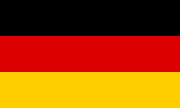 Helmut Haller
Helmut Haller
- 4 goals
 Geoff Hurst
Geoff Hurst Franz Beckenbauer
Franz Beckenbauer.svg.png) Ferenc Bene
Ferenc Bene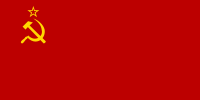 Valeriy Porkujan
Valeriy Porkujan
- 3 goals
|
|
|
- 2 goals
|
|
|
- 1 goal
|
|
- Own goals
.svg.png) Ivan Davidov (for Hungary)
Ivan Davidov (for Hungary).svg.png) Ivan Vutsov (for Portugal)
Ivan Vutsov (for Portugal)
FIFA Retrospective Ranking
In 1986, FIFA published a report that ranked all teams in each World Cup up to and including 1986, based on progress in the competition, overall results and quality of the opposition.[11] The rankings for the 1966 tournament were as follows:
Final
3rd and 4th place
Eliminated in the quarter-finals
Eliminated at the group stage
References
- ↑ "History of the World Cup Final Draw" (PDF). http://www.fifa.com/mm/document/fifafacts/mcwc/ip-201_10e_fwcdraw-history_8842.pdf. Retrieved 2010-06-03.
- ↑ [1]
- ↑ Jan Alsos. "1966 - Story of England '66". Planet World Cup. http://www.planetworldcup.com/CUPS/1966/wc66story.html. Retrieved 2010-06-03.
- ↑ "Mundial de Inglaterra 1966 - SIGUEN LOS CHOREOS A SUDAMÉRICA". Todoslosmundiales.com.ar. http://www.todoslosmundiales.com.ar/mundiales/1966inglaterra/historias/0035siguen_choreos.htm. Retrieved 2010-06-03.
- ↑ "Mundial de Inglaterra 1966 - EL ROBO DEL SIGLO". Todoslosmundiales.com.ar. http://www.todoslosmundiales.com.ar/mundiales/1966inglaterra/historias/0022robo_siglo.htm. Retrieved 2010-06-03.
- ↑ "Mundial de Inglaterra 1966 - Y POR SI TODO ESTO FUERA POCO". Todoslosmundiales.com.ar. http://www.todoslosmundiales.com.ar/mundiales/1966inglaterra/historias/0036porsitodo.htm. Retrieved 2010-06-03.
- ↑ "ENGLAND PORTUGAL 1/2 FINAL WORLD CUP 1966". YouTube. 2007-12-27. http://youtube.com/watch?v=f-GYBgpHKFU. Retrieved 2010-06-03.
- ↑ 8.0 8.1 8.2 McIlvanney, Hugh (30 July 2008). "From the Vault: Hurst's hat-trick wins the World Cup". guardian.co.uk (Guardian Media Group). http://www.guardian.co.uk/sport/2008/jul/30/englandfootballteam. Retrieved 22 June 2010.
- ↑ "UK Film and Television News - HD 'settles' 1966 World Cup controversy". 4rfv.co.uk. 2006-05-15. http://www.4rfv.co.uk/industrynews.asp?ID=51603. Retrieved 2010-06-03.
- ↑ "Kenneth Wolstenholme". The Daily Telegraph (Telegraph Media Group). 27 March 2002. http://www.telegraph.co.uk/news/obituaries/1388921/Kenneth-Wolstenholme.html. Retrieved 22 June 2010. "Kenneth Wolstenholme, who has died aged 81, was the voice of football on the BBC for almost a quarter of a century and the author of arguably the most celebrated words in British sports broadcasting, his commentary on England's last goal in the World Cup Final of 1966: "Some people are on the pitch. They think it's all over - it is now!""
- ↑ http://www.fifa.com/mm/document/afdeveloping/technicaldevp/50/09/00/fwc_mexico_1986_en_part4_279.pdf page 45
External links
- 1966 FIFA World Cup on FIFA.com
- Details at RSSSF
- History of the World Cup-1966
- Planet World Cup - England 1966
- 1966 World Cup newsreel footage at British Pathe (Adobe Flash video)
- "The story of North Korea at the 1966 World Cup", British Broadcasting Corporation
- Never-Seen: The 1966 World Cup - slideshow by Life magazine
|
||||||||
|
||||||||||||||||||||
|
||||||||||||||||||||
|
|||||||||||||||||||||||||||||
